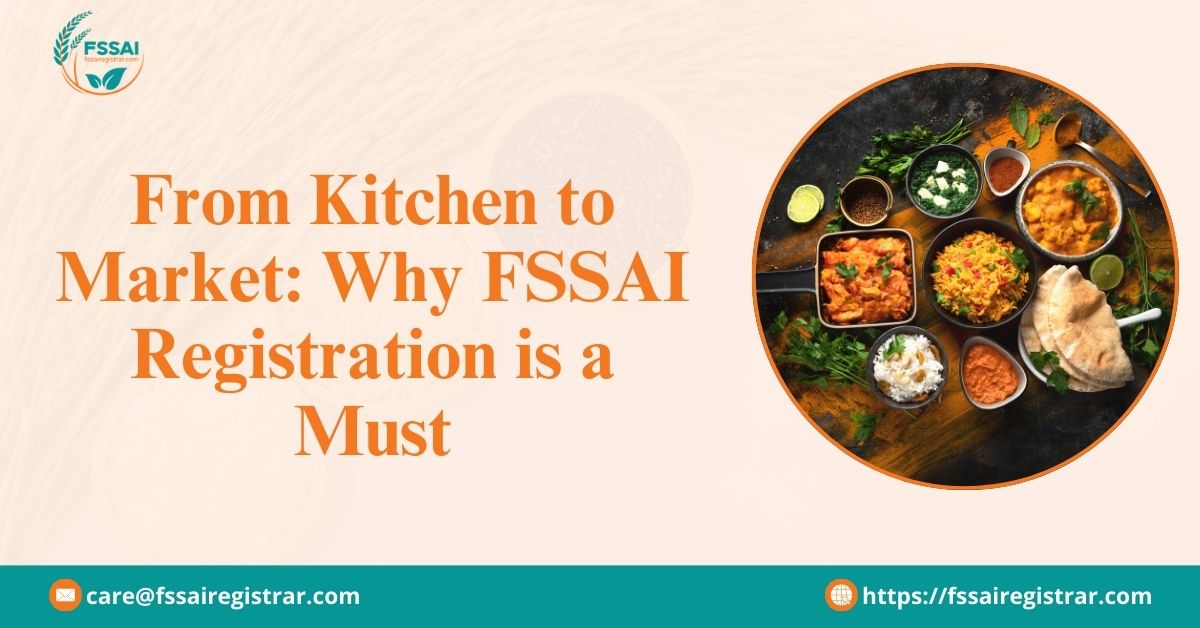
Introdiction
In today’s booming food industry, the journey from a home kitchen to the supermarket shelf or a food delivery app is more common than ever. But there’s one essential step that every food business — no matter how big or small — must take to make that journey legally and successfully: FSSAI registration. The Food Safety and Standards Authority of India (FSSAI) plays a vital role in ensuring that the food reaching consumers is safe, hygienic, and correctly labeled. Whether you’re a home chef selling pickles on Instagram, a cloud kitchen, a restaurant chain, or a food product manufacturer, obtaining an FSSAI Registration Online is not just a legal requirement — it’s a smart business move.
What is FSSAI Registration?
FSSAI registration is a certification issued by the Food Safety and Standards Authority of India, which is responsible for regulating and supervising the safety of food products in the country. It mandates that every food-related business register or obtain a license based on the size, type, and scale of operations. Each license comes with a unique 14-digit registration number that must be displayed on all food packages and premises, signaling compliance with food safety standards.
Why is FSSAI Registration a Must for Every Food Business?
1. Legal Obligation
As per the Food Safety and Standards Act, 2006, no person or entity can carry out any food business without an FSSAI license. Operating without one can lead to heavy fines, legal actions, and even closure of the business.
2. Consumer Trust and Credibility
Food safety is a growing concern for consumers. A visible FSSAI license number assures customers that the food they’re eating meets national hygiene and quality standards. It creates a level of trust and shows that you take safety seriously.
3. Business Expansion and Market Reach
Whether you’re entering retail chains, onboarding on food delivery platforms like Swiggy or Zomato, or exporting products, an FSSAI license is a basic requirement. It opens doors to collaborations and makes it easier to scale your business.
4. Brand Reputation
A registered food business looks more professional and trustworthy. Displaying an FSSAI logo on your packaging enhances your brand’s image and shows you’re compliant with Indian food laws.
5. Access to Loans and Investments
Investors and banks prefer businesses with legal documentation in place. An FSSAI license adds legitimacy to your venture and can help in securing funding or credit.
Types of FSSAI Registrations
FSSAI offers different levels of licensing based on the nature and size of the business:
-
Basic Registration – For petty food businesses with a turnover of less than ₹12 lakh per annum.
-
State License – For medium-scale businesses with turnover between ₹12 lakh and ₹20 crore.
-
Central License – For large businesses with a turnover above ₹20 crore or those involved in imports, exports, or operating in multiple states.
Who Needs FSSAI Registration?
If your business falls into any of the following categories, you are required to register:
-
Home-based food businesses and bakers
-
Street vendors and hawkers
-
Restaurants, cafes, and food trucks
-
Canteens and mess facilities
-
Food processors and manufacturers
-
Retailers and wholesalers of food items
-
Importers and exporters of food products
-
Cloud kitchens and online food businesses
How to Apply for FSSAI Registration: Step-by-Step Guide
Here’s a simplified process for getting your FSSAI license:
Step 1: Begin Online
Kick off your registration by heading to the official FSSAI website. This is where all food business operators (FBOs) start their compliance journey.
Step 2: Enter Your Business Details
You’ll be prompted to fill in crucial information—like your name, business structure (proprietorship, partnership, company), food category (manufacturing, retail, distribution, etc.), and contact details. Be ready to upload key documents like your PAN card.
Step 3: Double-Check Before Submission
Go through everything carefully—spelling, numbers, business category, and uploads. Accuracy here ensures faster processing.
Step 4: Make the Payment
Proceed to pay the licensing fee online. The cost depends on the size and nature of your food business and whether you’re applying for a Basic, State, or Central license.
Step 5: Verify with OTP
You’ll receive a one-time password (OTP) on your registered mobile number or email address. Enter it to validate your application.
Step 6: Prepare for a Site Visit (if required)
Some businesses may be subject to a site inspection by FSSAI officials. This is done to assess compliance with hygiene and safety regulations. Keep your premises inspection-ready.
Step 7: Receive Your License
Once approved, your FSSAI license will be issued digitally. You’ll receive a notification, and the certificate will be emailed to you. You can also download it directly from the portal.
Common Mistakes to Avoid
-
Selecting the wrong license category
-
Submitting incomplete or incorrect documents
-
Failing to renew the license on time (it must be renewed before expiration)
Suggested read: Renewing and Upgrading Your FSSAI License
Conclusion
The Indian food industry is filled with immense opportunity, but also fierce competition. One thing that sets a serious, scalable food business apart from the rest is FSSAI registration. It’s not just a legal checkbox; it’s a badge of quality, trust, and responsibility. Whether you’re just starting your homemade jam brand or expanding a nationwide food chain, FSSAI is your passport from kitchen to market. Don’t delay — register today and cook up your business success with compliance and confidence.